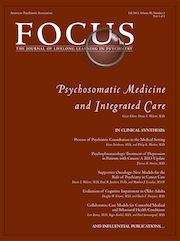“I’ve been asked to assess a patient as a potential candidate for organ transplant. What should I be looking for?”
Reply from James L. Levenson, M.D.
Since the beginning of organ transplantation, psychiatrists and other mental health professionals have been involved in the screening of candidates. Because of the shortage of donor organs, there is increased pressure to select patients who will benefit most, i.e., maximizing graft and patient survival and quality of life. But that is only one of the reasons for psychosocial screening. Reasons for screening include assessment of the patient’s ability to provide informed consent; identifying comorbid mental illness, substance abuse, or maladaptive behaviors; describing the patient’s coping and defensive style; assessment of the patient’s support system; and measuring cognitive functioning in order to measure postoperative changes (since organ failure so frequently causes reversible cognitive impairment).
In the earliest days of transplantation, screening included judgments about the relative social worth of candidates, but that is not considered an appropriate factor. The belief that this is the purpose of screening persists among some patients and families and may unconsciously seep into transplant team members’ opinions regarding a patient’s suitability for transplant. Perhaps this is in part because so many of the topics covered in a psychosocial pretransplant evaluation do have some relation to social worth, including financial status, education, occupation, legal problems, and social support. The key screening questions to be answered are:
“Does the patient have any psychiatric or psychosocial characteristics that could interfere with treatment and reduce the chance of graft survival? If so, are they amenable to change—are there interventions that can improve the patient’s ability to adapt to transplantation?”
While some psychopathology can interfere with the acute pre- and posttransplant period, most of the concern is with whether the patient can adhere to a lifetime of obligatory adherence to immunosuppressant and other posttransplant medications, return visits to the transplant clinic, and the need to be vigilant for adverse consequences of immunosuppression. Relevant considerations include the quality of the patient’s support system including availability and stability; psychopathology including defensive and coping styles; health behaviors, drug and alcohol use, adherence with prior medical recommendations and medications, and the patient’s understanding of transplantation and the lifelong obligations.
In the earlier years of transplantation, it was assumed that patients with current or even past histories of major psychopathology (e.g., schizophrenia, bipolar disorder) or substance abuse would not be able to be sufficiently adherent with the demanding posttransplant care regimen or would continue poor health behaviors that would risk hastening their demise. Thus for many years liver transplant programs would not consider as candidates patients with alcoholic cirrhosis, until it was demonstrated through careful follow-up studies that selected patients with alcohol dependence histories had medical outcomes including survival equivalent to other patients. It is important to note that the psychosocial evaluator must still assess a particular patient’s alcohol problem status, since all studies of transplanted alcoholics were those who were selected for transplants. The most severe substance abusing or psychiatrically disturbed patients are not referred to transplant programs for evaluation (or don’t show up).

